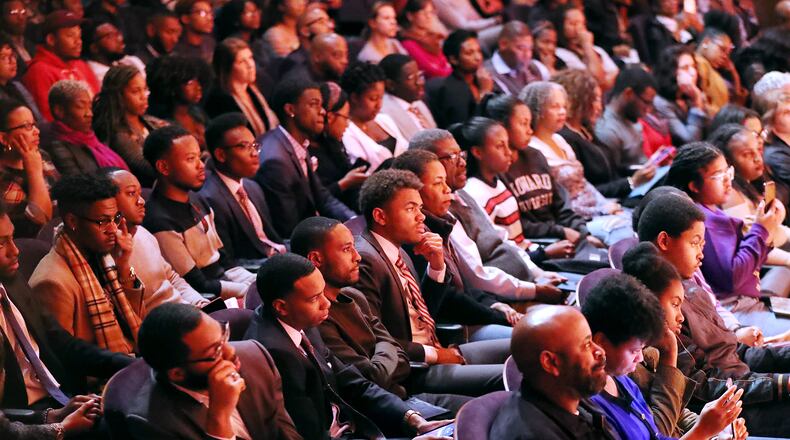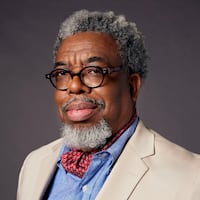Three of the top polling Democratic presidential candidates held rallies on Atlanta University Center campuses this week as part of their visit to the city for Wednesday's debate. Pete Buttigieg, the mayor of South Bend, Indiana, came to Morehouse College on Monday. U.S. Sens. Bernie Sanders and Elizabeth Warren held rallies at Morehouse and Clark Atlanta University, respectively, on Thursday.
An appearance by former Massachusetts Gov. Deval Patrick at Morehouse on Wednesday was canceled due to low attendance, according to news reports. Patrick entered the race last week.
“They are recognizing the potential of what HBCUs produce and I appreciate that,” said Phil Edwards, a 22-year-old Morehouse senior as he waited to hear Warren at Clark Atlanta. “We are at a state where diversity and inclusion need to be highlighted. I think the momentum will continue with black colleges as they continue to see our value.”
Wading through a growing crowd at the Warren rally on his campus, Clark Atlanta President George French Jr., said has been impressed with the field of Democrats as they court the black college vote.
“There was a time when Democrats took the African American vote for granted, but from what I have seen during this election season they know that our vote is pivotal,” French said. “And the black college is the most vital group because the HBCUs created the black middle class.”
>> RELATED | Read the AJC’s series on the health of HBCUs
Young voters, particularly African Americans, propelled Barack Obama to the presidency in 2008 and to reelection in 2012. Political experts believe they’re a key constituency to winning the party’s 2020 nomination.
“The Atlanta University Center has produced some of the greatest leaders in the world,” said Clark Atlanta political science student Queen Jonafá Tervalon, 21. “This is the greatest place to be to get black voters.”
Nearly 300,000 students attend the nation’s 101 accredited HBCUs, which graduate more than half of the nation’s black doctors, lawyers and judges, and 40% of its African American members of Congress. More than 8,000 are enrolled at the Atlanta University Center.
>> READ | Democratic candidates take an extra day in Atlanta to woo black voters
>> PHOTOS | Presidential candidates make their pitch in Atlanta
Both of the two black candidates on the debate stage Wednesday have deep ties to black colleges. U.S. Sen. Kamala Harris is a 1986 graduate of Howard University and kicked off her campaign at the Washington, D.C., school. U.S. Sen. Cory Booker’s father, a former Atlanta resident, attended North Carolina Central University.
At Wednesday’s debate, Booker was one of only two candidates to even mention HBCUs.
“We’re all united in wanting to fund HBCUs,” the New Jersey senator said. “Heck, I wouldn’t be here if it wasn’t for two parents that went to HBCUs.”
Warren mentioned her plan to steer $50 billion to HBCUs during the debate and reiterated it Thursday night on campus. In the hours prior to her coming on stage, Clark Atlanta’s gymnasium slowly turned into a party with students chanting and dancing in the stands. The school choir sang the National Anthem and the Negro National Anthem, “Lift Every Voice and Sing.”
But beyond the fun and festivities, students were looking for answers.
“It is huge for the candidates to reach out to HBCUs, said Javonni Ayers, a 19-year-old sophomore at South Carolina State University who arrived in Atlanta with three busloads of students. “But they are not coming up with a plan to save us.”
Many HBCUs are in financial peril, due to state budget cuts and enrollment declines.
“HBCUs need money,” said Sydney Pascal, a 21-year-old Spelman senior from Los Angeles and early Warren backer. “A lot of the candidates have laid out plans for HBCU funding, but we can always use a little bit more.”
Several candidates have said they want to increase funding to the schools.
Sanders laid out his plan Thursday at a rally outside the Martin Luther King Jr. International Chapel. The candidate pointed at a statue of King — the civil rights leader and Morehouse graduate — and referenced him three times during his remarks.
Morehouse students Jartavius Edmond and Donald Moore III attended the Sanders rally. They applauded his remarks, but want results.
“I just feel like they are focused on saying what they want to say and not putting it into action,” said Edmond, 22.
Matthew Platt, an associate political science professor at Morehouse said his students have said the candidates thus far failed to excite them because they are not discussing issues important to them, such as police misconduct, criminal justice sentencing reform or the underlying causes of student loan debt.
Still, Platt said, the campaign stops are necessary.
“If these candidates didn’t do this, then there would be stories about why didn’t they do any outreach.”
WHAT CANDIDATES HAVE SAID
A sampling of what the major Democratic presidential candidates have said about historically black colleges and universities:
Joe Biden:The former vice president's overall plan calls for investing $70 billion into black colleges to make them more affordable through grants and to increase enrollment, retention, completion and employment rates. The plan would also create research incubators and expand career pathways for HBCU graduates.
Cory Booker:Booker, whose father, Cary, attended North Carolina Central University, got into a bit of hot water in March when he tweeted that "HBCUs are not just for African Americans." But in January 2018, the New Jersey senator introduced the HBCU Capital Financing Improvement Act, which is a bill that aims to help improve the financial health of HBCUs.
Pete Buttigieg: Earlier this week, at Morehouse College, Buttigieg proposed a $500 billion program that would make college more affordable for working and middle-income families. Part of that package would include $50 billion over the next decade to "level the uneven playing field" of historically black colleges and other institutions that serve minorities. "Our economy is changing and it's past time to grow the pathways to opportunity in America," said Buttigieg. "That starts with making college affordable for every student from a working or middle-class family and making a historic investment in HBCUs."
Kamala Harris: A 1986 graduate of Howard University, Harris is the only candidate to actually attend an HBCU. Her plan calls for investing $60 billion in STEM education at HBCUs and minority-serving institutions as a way to open more doors for black entrepreneurship.
Amy Klobuchar: Her "Many Paths to Success" Post-Secondary Education Plan would strengthen and increase affordability for HBCUs through what she calls a "Pathways to Student Success initiative." Participating HBCUs would receive federal funding to waive or significantly reduce the first two years of tuition for low-income students at four-year schools.
Bernie Sanders: Speaking Thursday at Morehouse College, in the shadow of the Martin Luther King Jr. statue, Sanders unveiled a $5 billion plan to train more teachers at historically black colleges and universities and a separate $5 billion program aimed at preparing more black dentists and other health care professionals.
Elizabeth Warren: In April, Warren proposed a radical higher education reform package that would include $50 billion in aid for HBCUs. "For decades, black Americans were kept out of higher education by virtue of overtly discriminatory policies," Warren said in April. "Even as the civil rights movement rolled back racially discriminatory admissions policies, the stratification of our higher education system kept students of color concentrated in under-resourced institutions and left them vulnerable to predatory actors."
Andrew Yang: Yang has promised $250 million in federal funds to provide training programs in grant writing for faculty and staff at HBCUs; to provide $7.5 billion in federal funding for general infrastructure improvements and $750 million for building out a fundraising infrastructure; to provide $6 billion in federal funding for scholarships and internships through the White House Initiative on HBCUs; and to end any practices that allow banks to charge HBCUs higher fees.
The Latest
Featured









